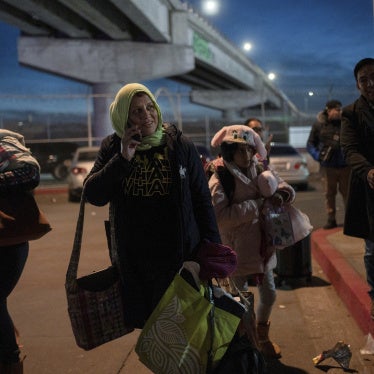The U.S. Congress should pass legislation to roll back post-September 11 policies that have led to arbitrary detentions and due process violations. A bill introduced in Congress on June 16 would ensure respect for basic rights and fair treatment in the United States, particularly for people detained under U.S. immigration laws.
“The U.S. government’s roundup of immigrants after the September 11 attacks was plagued by abuses,” said Wendy Patten, U.S. advocacy director at Human Rights Watch. “By passing this legislation, the Congress can help make sure this never happens again.”
The legislation, entitled the Civil Liberties Restoration Act of 2004 (CLRA), would address a range of rights violations that occurred in the aftermath of September 11, when the U.S. Justice Department arrested and detained some 1,200 people. Over 760 non-citizens were detained on immigration charges, while others were held as material witnesses or on criminal charges unrelated to the Sept. 11 attacks.
As Human Rights Watch found in its August 2002 report, “Presumption of Guilt,” the “special interest” detentions of non-citizens involved five major abuses: detention without charge for up to four months, denial of an opportunity for release on bond, interference with the right to counsel, secret deportation hearings, and excessively harsh conditions of confinement that included cases of physical and verbal abuse.
The new legislation would protect against these abuses by ensuring due process for people detained on suspicion of immigration violations. It would require prompt notification of charges, ensure fair bond determinations based on the facts of each case, and end secret arrests by prohibiting the blanket closure of deportation hearings.
“Most of these flawed policies remain in place, and could be used again,” said Patten. “Congress should pass this bill to prevent the government from misusing the immigration laws to eviscerate the basic rights of non-citizens.”
In June 2003, Human Rights Watch’s core findings were confirmed by the U.S. Justice Department’s own Inspector General, an internal oversight unit that issued a highly critical report of the government’s handling of these immigration detentions. According to the report, many non-citizens who had no connections to terrorism languished in detention for months because of new policies put in place by the Justice Department after September 11. Amid criticism that the Justice Department was questioning and detaining people based on little more than national origin or religion, the Inspector General found that nearly half of those held on immigration charges as “special interest detainees” were from Egypt and Pakistan, two predominantly Muslim countries.
The Inspector General later uncovered videotapes of post-September 11 detainees being slammed into walls and subjected to other forms of physical abuse at a federal detention center in Brooklyn, New York. Whether those responsible for these abuses will be held accountable remains a serious question. The secrecy surrounding these detentions likely contributed to a climate that fostered abuse.
“In the wake of the prisoner abuse scandal at Abu Ghraib, Congress should seize this opportunity to show the world that the United States takes seriously the rights of people it detains,” Patten said.
The legislation has the active support of a broad new coalition of U.S. organizations concerned with civil rights, civil liberties, immigrant rights and human rights in the United States. These groups came together to respond to the erosion of basic rights since the September 11 attacks, particularly for immigrants. The coalition, called the Rights Working Group, includes national and local groups around the United States who are all working to build support for the legislation. This week, local groups across the country will hold rallies and press conferences to call attention to the steady undermining of human rights in their communities due to misguided post-September 11 policies.
The CLRA, to be introduced today in both the Senate and House of Representatives, is co-sponsored by Senators Ted Kennedy, Patrick Leahy, Russ Feingold, Richard Durbin, and Jon Corzine and by Representatives Howard Berman and William Delahunt. The legislation would address a number of issues regarding critical detention, due process, and privacy rights and surveillance. The bill would:
- End the government’s ability to issue a blanket order closing all deportation hearings to the public and to family members of detainees, and permit the closure of all or part of a hearing only if the government demonstrates a compelling privacy or national security interest before an immigration judge.
- Require that individuals detained for immigration violations are advised of charges within 48 hours and given the right to a fair bond hearing.
- Establish an independent immigration court within the Department of Justice to promote fair hearings by a competent, independent and impartial tribunal.
- Terminate the misguided National Security Entry-Exit Registration System—a special registration program for immigrants already in the United States from primarily Arab, Muslim or South Asian countries—while encouraging fairness and a concentrated focus on those who pose a threat to the national security or safety.
- Eliminate harsh penalties for technical violations, such as the failure to provide notification of change of address within 10 days.
- Facilitate better law enforcement practices by ensuring minimum accuracy of information in the national crime database relied upon daily by state and local law enforcement.
- Ensure that people who are charged with a crime based upon national security surveillance would see the evidence against them in the same manner as people charged with a crime based upon other kinds of classified information.
- Mandate government reports to Congress on data-mining activities in order to protect privacy and due process rights.
- Limit the secret seizure of private databases and individual records (in the House version of the bill).







